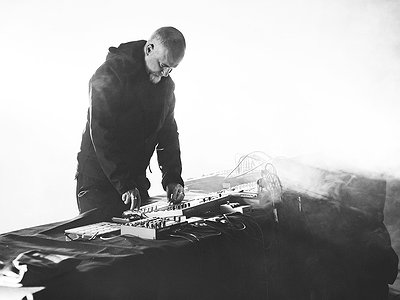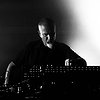Can you talk about a breakthrough work, event or performance in your career? Why does it feel special to you? When, why and how did you start working on it, what were some of the motivations and ideas behind it?
I actually have a few.
Playing live the first time with Sigillum S: we played in a squat managed by anarco punks. I was feverish, raging, the place was deadly cold, it was January. But it was packed. We had no idea what we were going to do. We had some equipment, metal piece, a semi broken guitar and a drum machine. It was pure madness for 40 minutes. A wall of noise and screams. They loved it. I can still remember the rush of adrenaline I had once I was on stage.
Playing live with Somma: Bill Laswell, Hamid Drake, Myself, Toshinori Kondo, Gigi, Raiz, Petulia Mattioli on live visuals and 9 Tibetan Monks. Everybody on stage, in front of His Holiness The Dalai lama. Improvising together. That’s has been a hell of a ride. It really opened up possibilities, it changed my approach to improvising from the “going wild” side to the “going wild but come back home to the main theme” one.
It shaped my music so much.
[Read our Bill Laswell interview]
Playing live with Kondo: He was a giant. End of story. He has been a master for me and many. When we recorded the first Charged album it was January, at his place in Amsterdam, a former bank where the heating system was turning on at office hours meaning that before 9 am and after 5 pm the temperature was a nightmare, especially for me who's always cold. Kondo was waking up around 5 am and meditating in a giant room on the second floor. It was freezing and he was calmly there, silent. I was dreaming of having 20 degrees and he was floating in space. After about one hour you could hear him playing trumpet and blasting it at full volume.
He was always concentrated on tracks, he knew exactly where we were, what we were doing, were he wanted to go with the arrangement … in the cold, in the fog of early morning. Me embracing a portable radiator, him playing trumpet.
Playing and recording with Harold Budd and Robin Guthrie.
I always loved Harold's music, since Eno involved him in the records for EG. Same love for Cocteau Twins. In 2010 Harold and myself decided to do another record together after the live one (Fragments from the inside). This time a studio one. He then proposed to me to involve also Robin Guthrie. Well, what could I say. Robin has been one of my idols since I was 18 years old. We went in studio to record and it was pure bliss.
I had in mind some piano themes that I played to Harold and he asked me to play them on a synth while he played piano. I was was scared to death as I’m not a piano player nor a keyboard one. I use these instruments in an empiric way. Anywy, it worked magic. We then went live for two gigs, behind us a giant screen with Petulia Mattioli videos. It was amazing. Robin and myself became close friend, it’s a pleasure to talk with him and spend time together. He’s also a fantastic chef and photographer.
Harold is not with us anymore, we won’t be able to record another album together.
I can’t read anymore his two lines emails or the short poems sometimes he was sending to Petulia and me. It’s the same feeling I have for Kondo, an enormous void.
There are many descriptions of the ideal state of mind for being creative. What is it like for you? What supports this ideal state of mind and what are distractions? Are there strategies to enter into this state more easily?
I need emotions. All my music is mainy based on emotions and feelings. Mostly stimulated by images. When I'm in that "state" I forget about everything. I forget to eat, to go to the toilet, to interact. I can go on working for hours and hours, like I’m somewhere else. I can be distracted by ringing phones, doors slamming and such or if I have to do something at a certain hour of the day; my mind starts to anticipate it and slowly comes out of that sort of “trance”.
I have no strategies to go “there”, it just happens. When I create sometimes a magic happens and it’s like painting, it happens by itself, unrequested.
Music and sounds can heal, but they can also hurt. Do you personally have experiences with either or both of these? Where do you personally see the biggest need and potential for music as a tool for healing?
The first years of Sigillum S where kind of interesting on this matter. I was playing live Tibetan ritual instruments made of human bones and we started to notice that everytime I was playing them someone was feeling sick. It happened during a track on the subject of anxiety and despair.
I don’t know if it was me, the tracks or the instruments. But more than once we had people feeling sick. Maybe it was just that the tracks were horrible? (laughs)
There is a fine line between cultural exchange and appropriation. What are your thoughts on the limits of copying, using cultural signs and symbols and the cultural/social/gender specificity of art?
We live in a fluid and watery society, on an interconnected planet where everything reaches everybody with any possible means and on any imaginable media. There’s a constant exchange of information, we live surrounded by them, harassed by data, raped by images, and forced to swallow news we don't want to.
If I think about 20 or 50 years ago your questions could have a meaning but today we drown in the stream of everything and I suspect that the line you’re mentioning is not there anymore. It already happened, it’s a melting orgy pretty much like the final scene of Brian Yuzna's movie “Society”. Everyone can be anyone at any time and anywhere.
As far as using signs and symbols it’s something I do since the 80’s when I created Sigillum S, it’s a “cut up” approach, recombining elements to create and generate something else; tearing apart symbols and signs to let the user generate their own tools and rituals.
Our sense of hearing shares intriguing connections to other senses. From your experience, what are some of the most inspiring overlaps between different senses - and what do they tell us about the way our senses work?
Hearing and tasting. Listening to music and seeing the world go round, or walking while music is in your ears. I listen to a lot of music when I’m flying. It’s a perfect moment to mix the sight with earing.
Touch, music machines, and hearing a result. That’s another one that is so rewarding, at least for me. Almost erotic I must say. I see hearing as deeply connected to seeing, touching and I find it interesting to program self evolving synth patches or sequences and close my eyes for a while to see if they carry me somewhere else.
It's amazing how hearing can completely shift the perception of the surrounding. In the past I created sound installations in museums using a 10.2 system. Basically 2 x 5.1 playing the same music but not in sync. The effect was incredible and the settings was a natural history museum at night with very few light. Really intriguing
Art can be a purpose in its own right, but it can also directly feed back into everyday life, take on a social and political role and lead to more engagement. Can you describe your approach to art and being an artist?
I mostly create for myself, for my necessity of feeling surrounded by certain sounds. I have no idea if what I do has a political or social meaning, maybe my work with Sigillum S has but it’s not a question I ask myself too often. I just do it.
Maybe outside, in the “real” world, someone will discover what I do and my music becomes the soundtrack for what they do, feel, live. If only a single person is attracted by what I do this is what i call success. A personal one, an exchange of ideas and interests.
I don’t even know if I can define myself an artist to be honest, I see myself more like a craftsman, someone who uses media and tools to create new ones. Is this art? I don’t know.
What can music express about life and death which words alone may not?
Sufi masters think that music is the “elixir of sound” and in a way it is the soundtrack to our life and death. Even more than music what expresses the perfection of life and the highness of death are sound and silence. Silence between the notes, silence before music and after. Silence waiting for something vibrating in the air, this for me is the perfection of music in scoring life and death.
Each one of us relates to silence according to their own approach, silence adapts to the beginning and the end of life even better than music. It’s a space that needs to be filled, or a filled space going empty within a single second.



